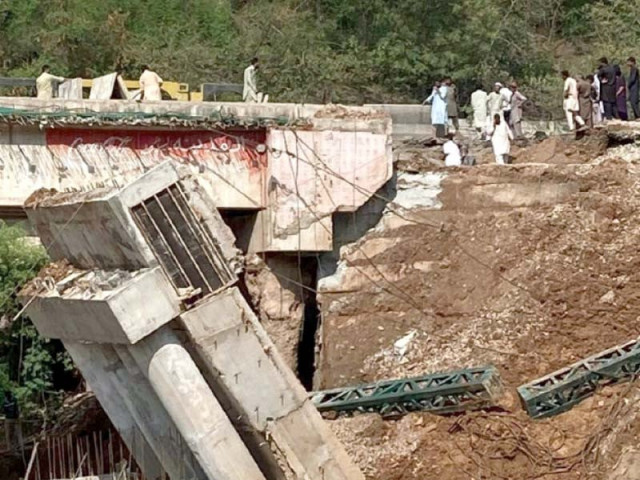Temporary fix for landslide-hit Soan Bridge
NHA, FWO start installation of portable Bailey bridge brought from Gilgit

Even on the third day, the damaged section of the Soan Bridge which caved in on Monday, could not be repaired as city administrators and contractors continued to provide deadlines for reopening the key entry/exit point to Rawalpindi.
As a temporary solution, the National Highway Authority and the Frontier Works Organisation (FWO) have transported a portable Bailey bridge from Gilgit, which was being installed at the impacted section of the bridge.
The damaged area of the bridge has to be concreted in order to be restored, which might take some time. Due to this, it was decided to install a temporary steel bridge, commonly known as the Bailey bridge to temporarily manage traffic flow.
A type of pre-fabricated, truss bridge, the Bailey bridge dates back to the second world war when it was used extensively by the British, Canadian and American military engineering units. It has the advantages of requiring no special tools or heavy equipment to assemble.
The wood and steel bridge elements are small and light enough to be carried in trucks and lifted into place by hand, without the use of a crane. The bridges are strong enough to carry tanks. Bailey bridges continue to be used extensively in civil engineering construction projects and to provide temporary crossings for pedestrian and vehicle traffic.
A senior NHA officer told The Express Tribune that the 60-foot Bailey Bridge that once the bridge was assembled, the damaged portion of the bridge will be attached to it, and the section would be functional for light transport vehicles.
They said that the temporary bridge would be fitted by Wednesday night or Thursday morning. However, heavy traffic will not be permitted on it. They added that the bridge would open for light traffic from Rawat to Rawalpindi once construction is complete.
A part of the bridge, which was undergoing an extension, collapsed with its pillars and girders on Monday. The bridge is being extended 20 feet on both sides to ease the traffic flow. It is part of an Rs8 billion road improvement project from Kutchery Chowk to T-Chowk, Rawat.
A primary reason for the collapse was erosion at the base of the bridge due to flooding. This resulted in a part of the bridge collapsing, creating a massive crater. The loosening took place during the night with the collapse taking place on Monday.
Traffic rerouted
Since that time, all vehicular travel has been prohibited on the route between Rawat and Rawalpindi.
Currently, light vehicles going to and from Rawalpindi are using the functional track of the Soan Bridge. The Rawalpindi traffic police have devised a separate route for heavy and freight vehicles. It is being diverted into Rawalpindi via T-Chowk, Karaal, Ammar Chowk and Kutchery Chowk.
Rawalpindi traffic police head Taimoor Khan confirmed that the Rawalpindi to Rawat side of the bridge was open to two-way light-duty vehicle traffic due to the bridge's condition.
Published in The Express Tribune, June 29th, 2023.



















COMMENTS
Comments are moderated and generally will be posted if they are on-topic and not abusive.
For more information, please see our Comments FAQ